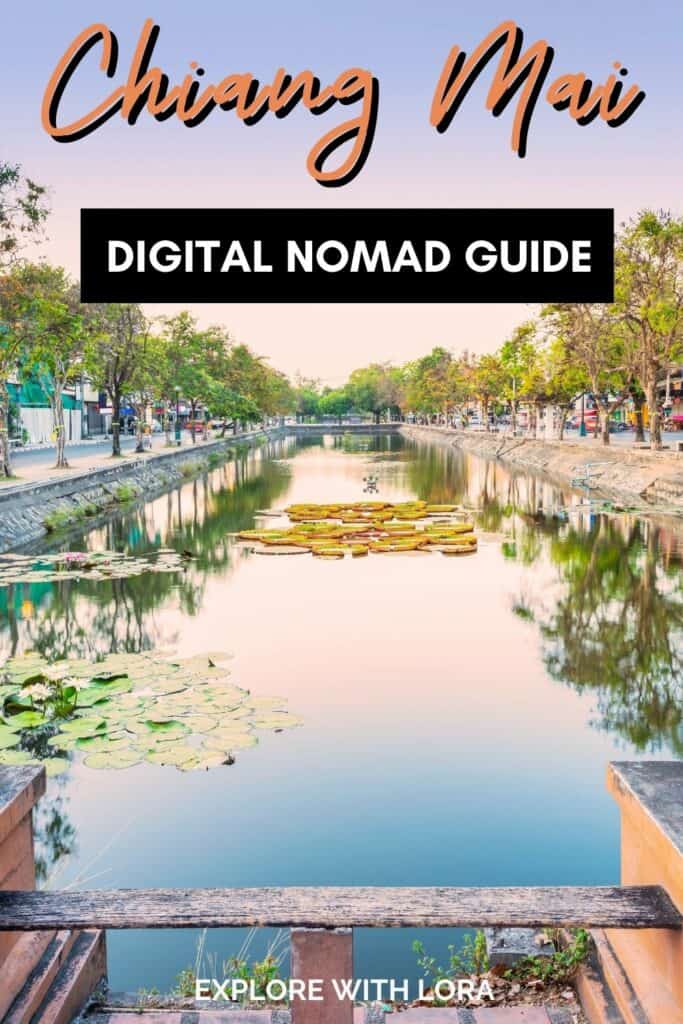This post may contain affiliate links. By clicking and making a purchase through the links, I earn a small commission at no extra cost to you. See my disclaimer for more information. This and display ads allow me to keep the site up to date and give back.
The Chiang Mai digital nomad community is one of the best in the world. If you’re looking for a place to start your nomadic journey, look no further than Chiang Mai.
Located in the heart of Northern Thailand, Chiang Mai is a beautiful and welcoming city with plenty to see and do. It’s surrounded by nature, with hiking trails, waterfalls, and elephant sanctuaries nearby.
The city is also a fantastic place to network with other digital nomads. There are many coworking spaces and social events where you can meet like-minded people from all over the world.
And while the quality of life is high, the cost of living is low.
Here’s everything you need to know about being a digital nomad in Chiang Mai, to help you decide if it should be your next nomad destination.

This post was written by Sammy from My Blonde Bucket List, a travel blogger from New Zealand who spent six months living in Thailand as a digital nomad. You can follow her adventures on Instagram.
I recently moved to Chiang Mai and have already fallen in love with the city, so I’ve included some of my recommendations in this guide.
My experience living in Chiang Mai as a digital nomad
I loved my time in Chiang Mai. I based myself here for almost six months after traveling the world solo and would’ve stayed longer if it wasn’t for the dreaded c-word.
I chose to base myself in Chiang Mai simply off the back of a google search for ‘Best digital nomad destinations.’
I had never been to Chiang Mai before, but I had traveled to Thailand a few times, so I semi-knew what to expect.
One thing I did underestimate is how much I would love this city! It was such a fun place to live, and the people were very friendly.
Pros and cons of living in Chiang Mai
A huge pro is that the cost of living in Chiang Mai is much lower than in other countries, which makes it the perfect place to live if you want to save money or are just starting out as a digital nomad.
The city has plenty of affordable accommodation options, so you can find something that fits your budget.
Pros
- Amazing food
- One of the cheapest places to live as a digital nomad
- Thai people are incredibly friendly
- Beautiful waterfalls and mountains to explore
- Great cafe culture and coworking spaces
- The city is walkable and easy to get around
- It has an international airport
Cons
- The air quality isn’t great during the burning season, and it can be unhealthy to spend large amounts of time outside
- If you don’t put yourself out there to meet others, it can feel lonely
- It’s far away from the beach
- You may have to do visa runs

Cost of living in Chiang Mai
In Chiang Mai, you can live comfortably on a budget of 1,000-1500 USD per month, or less if you live frugally.
To give you an idea, my rent for a one-bedroom condo in a nice apartment complex with a large pool costs a little over $300 a month.
I walked most places, so transport costs were low. However, if I needed a ride, I would use Grab to pick me up and take me to where I needed to go, as there is no Uber in Chiang Mai. Most of the time, this costs less than 100 baht (3 USD).
Many nomads rent scooters, which you can get for about 100 USD/month.
I started buying food at the supermarket to cook, but it didn’t take long to figure out this was the more expensive way to eat. Buying my meals was much cheaper; you just have to know where to go.
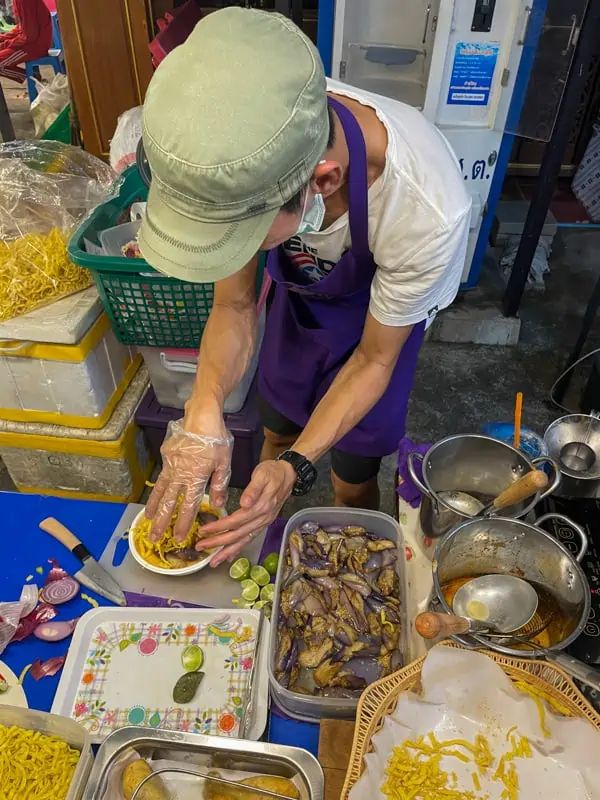
Local street food will cost about 0.50-2 USD a meal. If you eat at a western restaurant, it could be 5 – 10 USD, but I could also eat a good healthy meal for as little as 1 USD once I scoped out the local favorites.
I bought healthy vegetarian and vegan meals from the stalls downstairs at the Maya food court for about $1 a serving; it was my favorite place to eat.
Grab is also a great way to find cheap meals if you want something delivered to your home.
A local beer like Chang costs around 1.50 USD, but craft beer and cocktails can be much more expensive – sometimes up to 10 USD! So if you drink a lot, this can increase your living costs quickly.
There are plenty of free things to do in Chiang Mai, like visiting the local markets, exploring temples, and hiking to waterfalls.

Best areas to live in Chiang Mai
Chiang Mai is the largest hub of northern Thailand with a population of 1.2 million in the urban area. Still, it doesn’t feel like a big city living here. Most digital nomads live in a few neighborhoods within walking distance of each other.
The Nimmanhaemin (Nimman) area is one of the most popular for digital nomads. It’s a great location, close to downtown, and has plenty of cafes, restaurants, bars, and coworking spaces.
It is also within walking distance of Maya Mall, a large shopping center with most of the stores you need and a great food court.
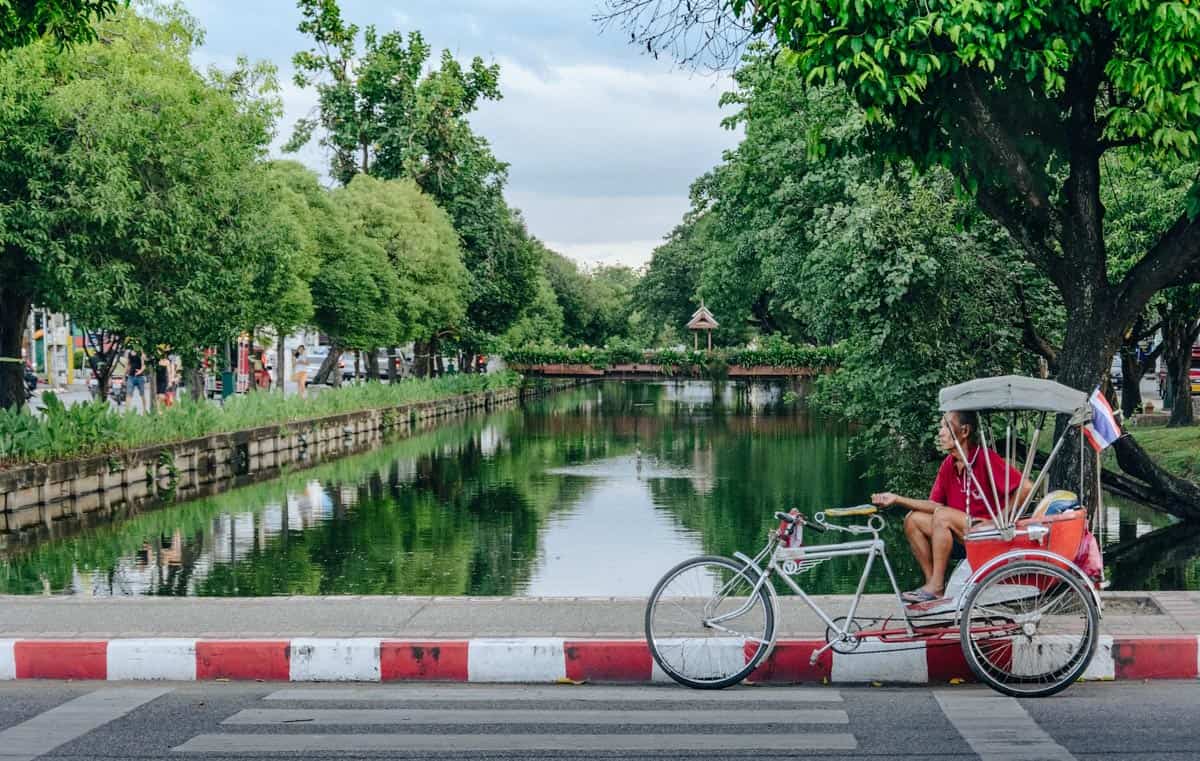
Many nomads also live in the Old City, a great central location with many Buddhist temples, cafes for coworking, live music, and rooftop bars on the river.
You can also find apartments in the Ban Sathaphon neighborhood, which is a 5 minutes drive from the Maya mall. It’s a more local neighborhood away from the nightlife but has a friendly vibe and affordable apartments.
It’s easy to get between these neighborhoods by walking, scooter, or getting a Grab, Tuk Tuk, or red trucks (they tend to overcharge you, so it’s better to order on Grab and get a fixed price).
Tips on finding long-term accommodation
The best way to find long-term accommodation in Chiang Mai is to wait and secure something once you’ve arrived. I did this, and I found the whole process incredibly easy.
Before you arrive, google what areas you think you’ll want to base yourself in, then book a hostel or a cheap hotel in that area. Only book 3-5 nights at a time, as once you find some accommodation you like, chances are you’ll be able to move in pretty quickly.
Once I decided on a condo, I could move in the following afternoon!
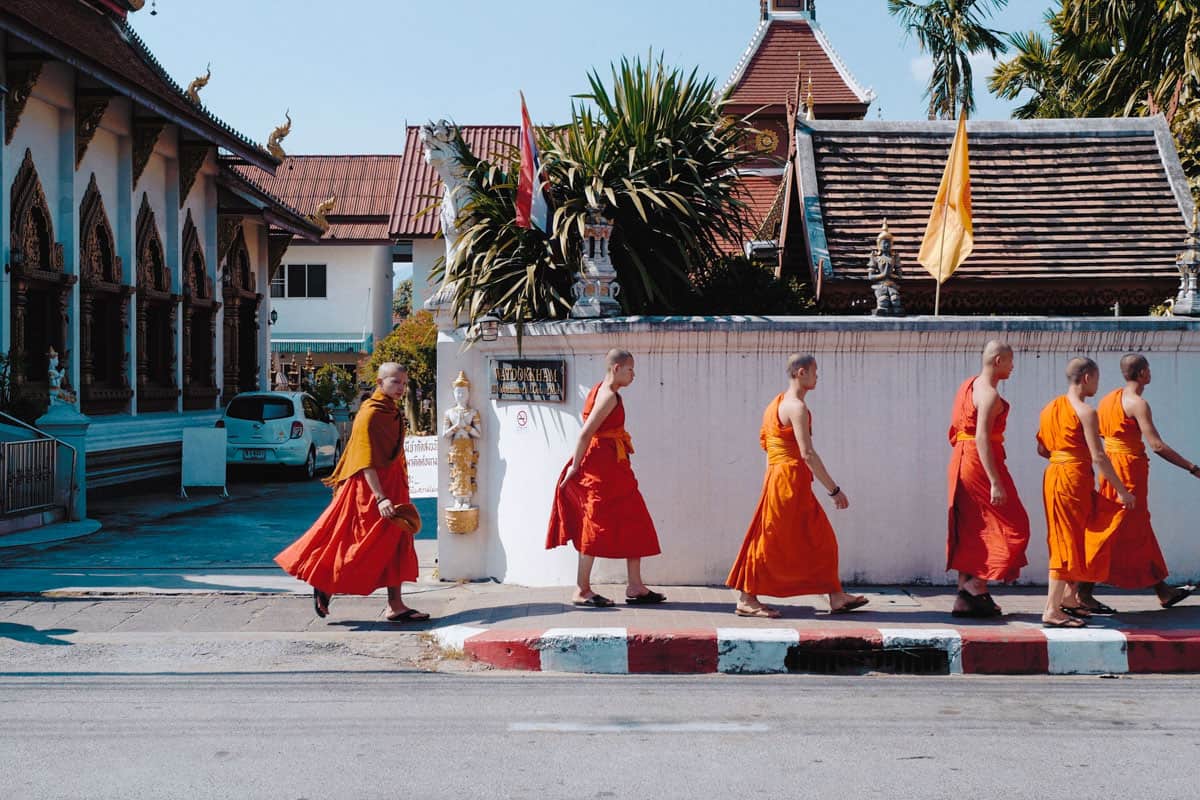
When it comes to finding accommodation, there are various Facebook groups you can join to get an idea of what you can get for your money.
But to really get a feel for the area, it’s a good idea to wander around looking at the different apartment complexes.
I would ask reception if they had any rooms available and if it would be possible to view them. Most of the time, it was, and it helped me quickly figure out what I wanted or didn’t want in a place.
It was also a good opportunity to see what facilities the apartment complex had, like a swimming pool or a gym, and determine whether it was on a busy road.
Of course, you can also look on websites like Airbnb and VRBO, but prices there are much higher than what you would pay by going directly through the landlord.
The best thing to do is book a place online for a few days and look when you get here. You can find hotel rooms on Booking.com or Agoda for as low as 20/per night.
If you want a specialist to help you, check out Perfect Homes.
Internet in Chiang Mai
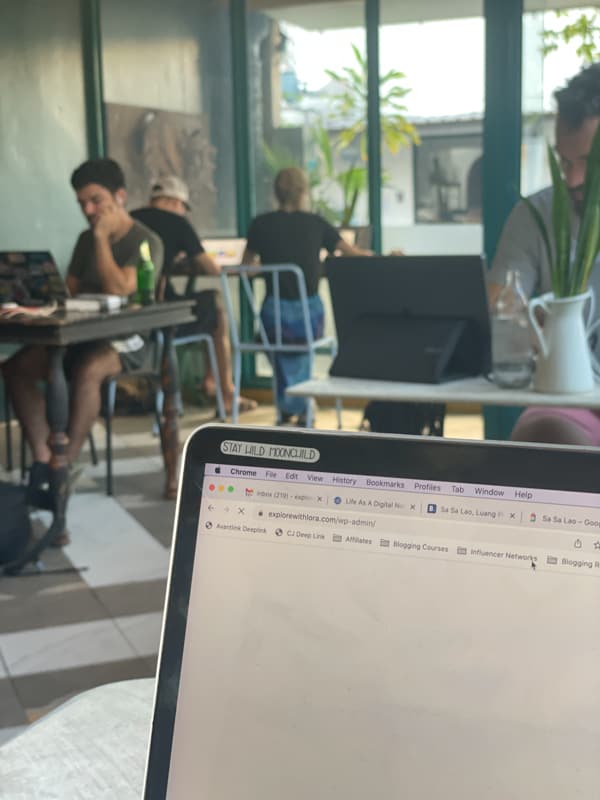
The internet in Chiang Mai is excellent. You can easily get fast WiFi speeds of around 300 MB, which makes it an easy city to work from. SIM cards are also very affordable here with 4G connections.
Many cafes and restaurants offer free WiFi and allow you to sit and work from them if you buy something, which is perfect if you feel like you need a change of scenery and want to escape your accommodation for a while.
Of course, there are coworking spaces you can visit too.
Best coworking spaces and cafes to work from in Chiang Mai
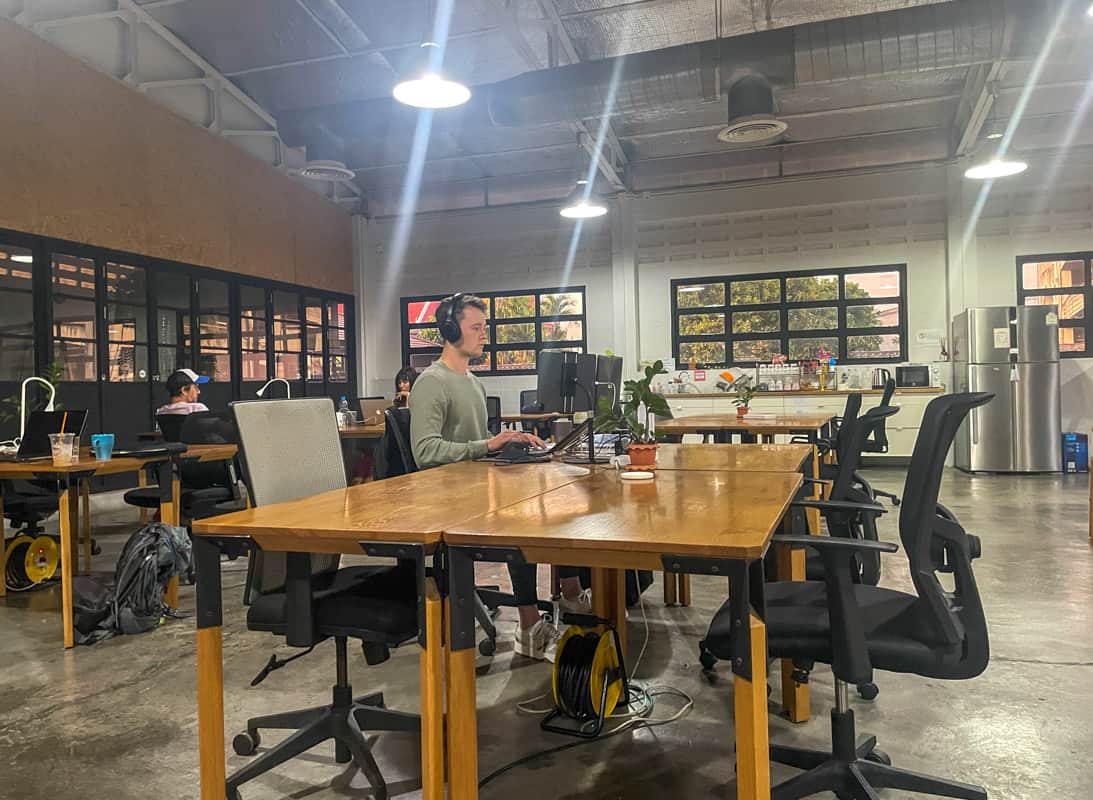
Chiang Mai has some excellent coworking spaces and coffee shops to work from, which is part of why the city has such a good reputation amongst remote workers.
Coworking spaces in Chiang Mai
- Punspace (Two locations in Old City)
- Hub53 (Nimman)
- Yellow Coworking
- CAMP (On the top floor of Maya mall – if you buy something, you get a WiFi pass for two hours).
Coworking cafes in Chiang Mai
All of the above offer the perfect environment for getting tasks done with free WiFi, comfortable seating, and plenty of other like-minded people around you.
Every Friday, there is a free coworking by the pool day at Buri Suri hotel, which is an excellent place to meet other nomads.
Visa requirements + digital nomad visa
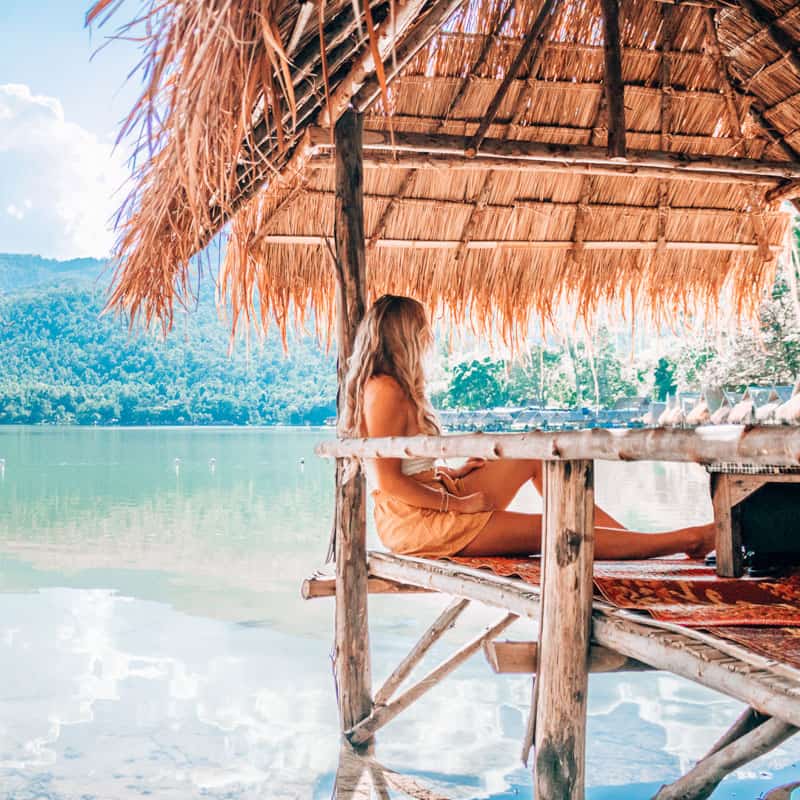
Thailand just introduced a visa that some digital nomads may qualify for called the Smart Visa.
To be eligible, you need to meet the following criteria:
- Have a valid passport (at least six months)
- Earn a minimum of $80,000 a year
- Work in the specific target industries
- Have health insurance coverage of at least $50,000
- Have worked for at least three years for a publicly traded company or a company that generates at least $150 million in annual revenue
Tourist Visa
Many nationalities can enter Thailand on a tourist visa which you don’t need to apply for before. You will receive the visa on entry to Thailand.
Canadians and Americans currently get 45 days on arrival, which can be extended for another 30 days with proof you are living here.
Many digital nomads live here on tourist visas, doing visa runs every few months within Southeast Asia. Thailand is neighboured by Cambodia, Laos, Vietnam, and Myanmar, so there are plenty of options.
Another perk of living in Chiang Mai is its international airport, with direct flights to many of the above places.
One-year Muay Thai or language visa
I’ve met a few people living in Chiang Mai on the Muay Thai ED Visa or Education Visa. Both visas allow you to stay in Thailand while studying Muay Thai or the Thai language.
This is an excellent way to stay in Thailand longer while learning a valuable skill that will help you further integrate into the Thai culture.
How to find community in Chiang Mai
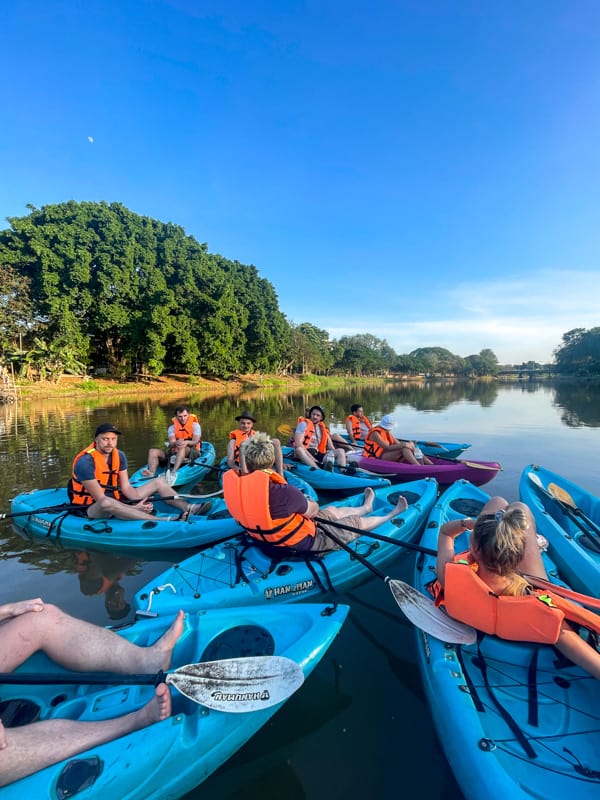
Chiang Mai has a thriving digital nomad and expat community, making it easy to meet other people.
The best way to meet other nomads or expats is by getting social in Facebook groups or Whatsapp groups and attending events. Look out for posts from others wanting to meet up or add one yourself.
The best Facebook groups to join are:
- Chiang Mai Nomad Girls
- Chiang Mai Digital Nomads
- Chiang Mai Happy Hour Nomads
- Chiang Mai Events
- Digital Nomad Coffee Club – Chiang Mai
There on WhatsApp groups for just about everything (dinner meetups, brunch, board games, drinking, waterfall hikes, kayaking, entrepreneurship). The groups may change, so it’s best to ask another nomad when you get here or in the Facebook groups what the most active ones are.
I attended a few meetsup my first week in Chiang Mai, and within a few days, I had a wonderful group of friends.
What is the best time to live in Chiang Mai?

Chiang Mai is warm all year round but generally has three seasons: The peak season (November to February), the hot season (March to May), and the rainy season (June to October).
The best time to live here is from November to February during the cool season. However, this is also the most popular time for tourism, so it can be crowded during this time.
You will want to try and avoid the burning season, which typically runs from January to March.
In the burning season, the farmers in northern Thailand burn their fields to prepare their land for the following year. The smog gets trapped in Chiang Mai, creating terrible air quality.
Most digital nomads tend to head south and explore the islands like Koh Samui or Koh Phagnan while they wait for the air quality to improve.
The rainy season starts in June and typically peaks in August/September, dwindling by October. This season can stil be a good time time to live here, as prices are lower and the forests will be at their brightest green.
Things you can do in Chiang Mai
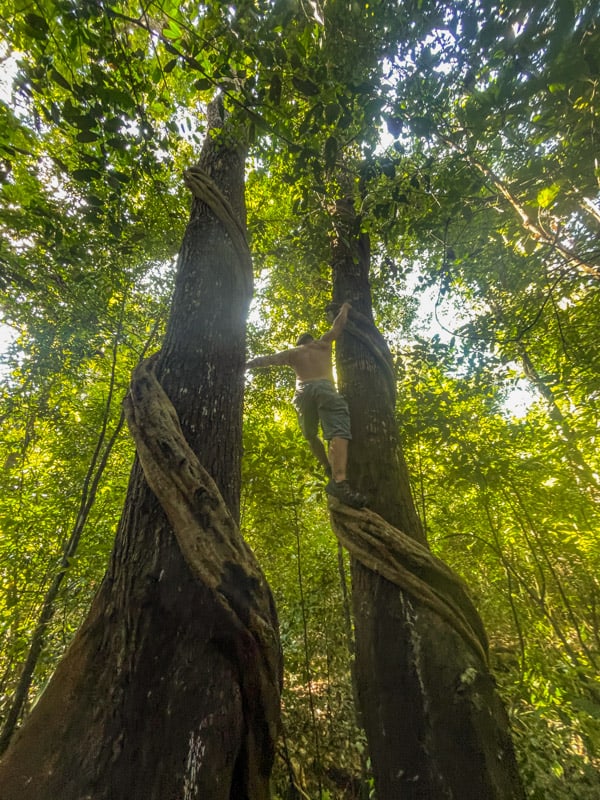
While the low prices and community attract remote workers to Chiang Mai, the scenery and vast amount of things to do get them to stay.
From visiting Thai temples such as Wat Chiang Man – Chiang Mai’s oldest temple – to exploring waterfalls and sampling local cuisine, there’s something for every type of traveler.
If you’re looking for something more fast-paced, you can visit surrounding national parks, sticky waterfalls, or cool off at the Grand Canyon Water Park. Known as the largest floating waterpark in Chiang Mai, it makes for a fun day trip.
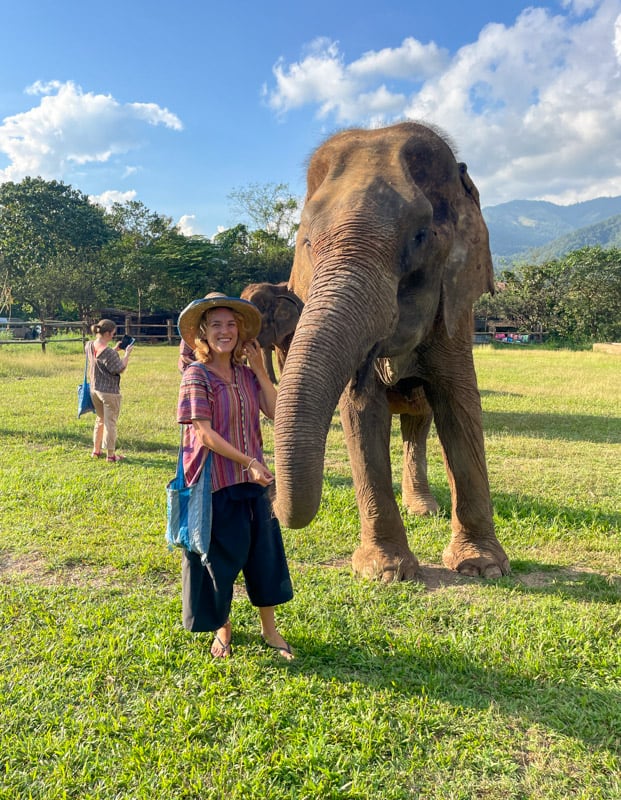
There are also many elephant sanctuaries about an hour outside Chiang Mai, which is a fantastic wildlife encounter.
After a day of exploring, you can unwind in town with a Thai massage; your muscles will probably need it! You can get a massage for as low as 120 baht at a temple up to 600 at a luxury spa.
If you want to immerse yourself in the culture more, why not try a cooking class? It’s a fun way to get to know how the most popular Thai dishes are made. Grandma’s cooking school is a great option for this.
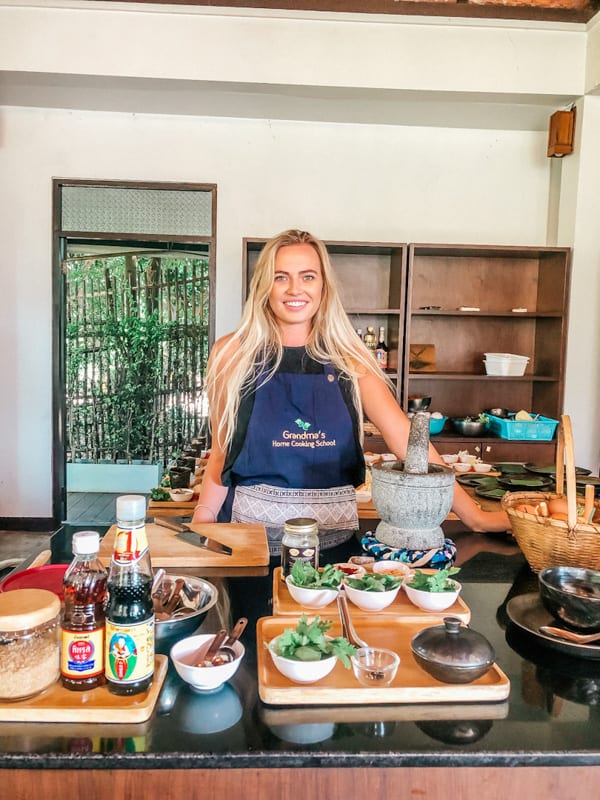
Last but not least, it wouldn’t be Chiang Mai without exploring its iconic night markets, which are bustling with delicious local foods, crafts and bargain finds. Night Bazaar is a must on your Chiang Mai itinerary.
If you fall in love with Chiang Mai, a great way to commemorate your time here is with a Sak Yant (bamboo tattoo).
I never thought I would get a tattoo, then found myself getting a sacred Sak Yant within a few days of arriving in Chiang Mai.
I did mine through this tour, which included a guide who translated between me and the Ajarn who gave me the tattoo. I was grateful to have the guide there to communicate what I wanted from the tattoo.
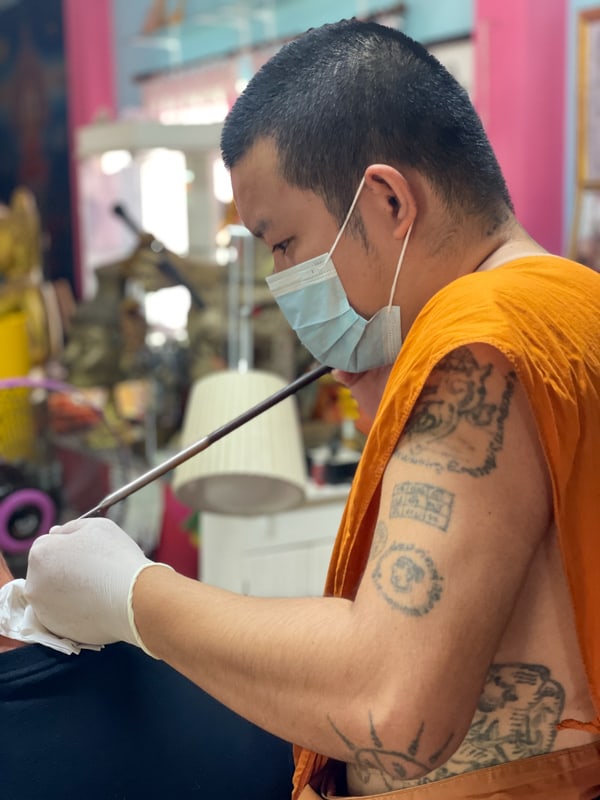
Travel insurance for Chiang Mai
One of the most important things you need is travel insurance! I use and love SafetyWing, insurance made for digital nomads that costs only 42 USD/month. It covers a wide range of adventure activities around Chiang Mai! You can read my full review here and get a quote below.
—
Chiang Mai, Thailand, is one of the best cities to live and work as a digital nomad.
Great weather, plenty of coworking spaces and cafes, high-speed internet, and affordable accommodation – it has everything you need to set up your remote working lifestyle.
Jumping into the remote work lifestyle? Check out these posts!
- Cheap places to live in Spain
- How to work remotely in the Caribbean
- 25 thoughtful gifts for someone moving abroad
